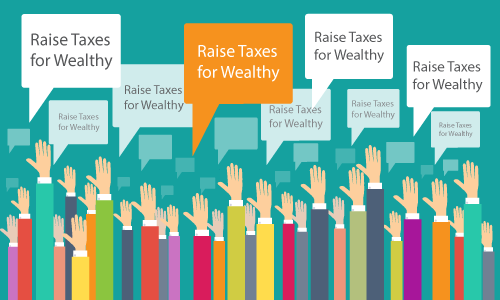Voters in Multiple States Choose Higher Taxes for the Wealthy

Of course, the big news from the election earlier this month was that Donald Trump shocked the world and defeated Hillary Clinton in the race to become the 45th president of the United States. However, there were several other important national, as well as local, election races and issues that were decided on November 8th. Not the least of which were several state measures aimed at raising taxes on high net worth individuals.
To that end, voters in both California and Maine decided that the rich needed to pay more taxes. In Maine, the vote to raise the state’s top tax rate from 7.15 percent to 10.15 percent was extremely close, passing by a narrow 50.4 percent to 49.6 percent margin. That means Maine will have the second highest top tax rate in the country in 2017, surpassing Oregon, which was number two in 2016 at 9.9 percent.
In California, meanwhile, the vote wasn’t even close, with 62 percent voting to extend temporary tax hikes already in place. Proposition 55 extended the hikes originally implemented in 2012 with Proposition 30. That means top earners, those who make $1 million or more a year, will continue to pay a tax rate of 13.3 percent at least until 2030. California will continue to have the highest tax rate for top earners in 2017.
So, while all signs point to Donald Trump lowering the federal tax rates, if you live in California or Maine and you’re a top earner, you won’t see any relief in the coming years in your state taxes.
http://www.forbes.com/sites/ashleaebeling/2016/11/10/voters-okay-state-income-tax-hikes-for-the-rich/#71480a7b16d0
IRS Preventing Audit
IRS Preventing Audit Do you want an IRS agent to make a visit to your office? I don’t know many people who do, but knowing strategies to prevent an unwanted visit could certainly save you from an extra bit of stress in life. Only one percent of taxpayers yearly are selected for IRS audits, but…
Tips for the Self Employed in Avoiding an IRS Audit
Tips for the Self Employed in Avoiding an IRS Audit If you are self-employed, the chance that you have of being selected for an IRS audit will be closer to your ballpark. The IRS looks for red flags that when processing tax returns, targeting individuals to potentially audit. Self-employment is a flag in itself as…
5 Steps to Becoming a Millionaire
5 Steps to Becoming a Millionaire In 2011, the number of households in the United States worth over $1 million was 8.6 million. Although the thought of acquiring a million dollars may be a whimsical fantasy for some, it is not out of reach. With careful saving and investing, becoming a millionaire is possible if…
Ten Questions That You Should Ask Prior to Purchasing a Stock
1. How does the company make money? The first thing that you should understand is how the company earns money. Just because everyone else is buying the stock and the price has run up tremendously does not mean that you should also be jumping on the bandwagon. I suggest that you review the annual report…



